牛津英语七年级上期各单元知识点归纳
牛津英语七年级上册期末复习知识点整理

牛津英语七年级上册期末复习知识点整理译林版牛津英语七年级上册期末复知识点整理Units1--4重点知识点总结n.名词v.动词vt.及物动词vi.不及物动词adj.形容词adv.副词prep.介词pron.代词conj.连词1、喜欢like / love / enjoy / be XXX (痴迷于)/ have fun / have a good time +doing sth.动词+doing的还有Go XXX good at doing sth./ do well in doing sth.XXX.2、“四大看”read vt.看读物(XXX等)look vi.瞧常用短语look at/ for/around/after/out/over/upsee vt.瞥见,夸大成效I can see you.watch vt.带有观赏性的寓目watch TV/ a film / a football game3、“五大穿着”Put on强调“穿上”的动作XXX ____XXX.Wear强调“穿着”的状态;进行时态表示暂时的情况XXX glassesDress(1)dress sb.(2) dress oneself(3) dress up as(4) get dressedIn(穿戴)后接颜色(或衣服),表示状态look!XXX is_____a XXX后接人指衣服穿在某人身上看出区别来。
The red coat looks nice on you.4、“四大花费”XXX:sb.(人)+ XXX.sb.(人)+ spend +工夫/款项+(in) XXX.pay:sb.(人)+pay +款项+for sth.cost:sth.(物)+ cost + sb.+金钱XXX时间XXX:it XXX sb. +时间+ to do sth.5、“三大地点副词”Home / there /here前不加任何的介词welcome home / come here / go there6、“三大使役动词”Make sb. do sth./ have sb. do sth. / let sb.do sth.7、晤面打号召用语(1)Nice to meet you . (2) Glad to meet you . (3) How are you ? (4) How are you doing ?(5)How is it going ?(6)How is everything going?(7) What’s up?8、基数词+year(s)+old透露表现“…岁”发问用“how old”名词性短语数词-year-old也透露表现年岁,但其为描述词性短语“前有冠词后著名(词)”Eg. Helen is 11 years old = Helen is an 11-year-old girl.9、Let’s与let us的区分Let’s do sth.指包括听者(对方)和说者(我们)都在内,表示建议Let us do XXX.指“让(允许)我们做某事”而听者(对方)不做,只有“我们”做10、play+the+乐器类名词e.g. Play the pianoPlay +球类活动play+ football / play cards / play chess11、She comes from Shanghai= She is from Shanghai .注:如何提问Shanghai及如何改一般疑问句12、be good at =do well in = be clever at = study sth. wellBe good at (反) be bad atdo well in (反) be poor in13、介词over的用法(1)”在…正上方” There is a bridge over the river.(2)”超出”A plane flies over the house(3)”跨越” There are over 20 boys in this class.(4)”竣事” Class is over! / Game is over.14、every one与everyone辨析区分(1)Every one能够与of连用,而everyone却不克不及与of连用Eg.every one of the children XXX.(2) XXX只指人=everybody而every one既指人又可指物配合点:谓语动词都要用“三单”15、family的用法:“家庭”作为团体谓语动词用“单数”He has a big family.“家人”夸大成员,是复数寄义,谓语动词用“真相” My family are at home.拓展:个人名词有people、class、police、sheep、deer、furniture等16、all/ both/ each/every/neither/ either的用法all(1)三者或三者以上“全部、都”(2)all + the +名词(all the afternoon = the whole afternoon)(3)all放在行为动词前,名词前;be动词后(4) all of +宾格/名词复数Both(1)二者都(2)后可跟of +宾格/名词复数Both sides of XXX指两个或两个以上“每个”个别Each side of the XXX.Every指良多人或事物的“部分”后接名词单数Every student is here .一切人都在。
七年级英语上册知识点牛津

七年级英语上册知识点牛津作为初中英语的开端,七年级英语上册的知识点牛津十分重要。
在这里,我们将对牛津七年级英语上册中的重要知识点进行梳理和整理,帮助同学们更好地学习和提高英语水平。
一、基本语法1. 一般现在时:表示现在正在进行或习惯性的动作。
例如:I usually get up at six in the morning.(我通常早上六点起床。
)2. 现在进行时:表示现在正在进行的动作。
例如:She is reading a book.(她正在看书。
)3. 一般过去时:表示已经完成的动作。
例如:I watched a movie yesterday.(我昨天看了一部电影。
)4. 现在完成时:表示已经完成的动作对现在造成的影响。
例如:I have finished my homework.(我已经完成了我的作业。
)5. 现在完成进行时:表示从过去某时开始一直到现在正在进行的动作。
例如:I have been studying English for two hours.(我已经学了两个小时的英语。
)二、基本词汇1. 数字:one, two, three, four, five, six, seven, eight, nine, ten2. 人称代词和物主代词:I, you, he, she, it, we, they, me, you, him, her, it, us, them3. 颜色:red, blue, green, yellow, black, white4. 学科:math, science, history, geography, music, art, PE三、基本句型1. 陈述句:主语 + 谓语 + 宾语例如:I love English.(我爱英语。
)2. 疑问句:疑问词 + 动词 + 主语 + 其他信息例如:What is your name?(你叫什么名字?)3. 否定句:主语 + 动词 + not + 宾语例如:I do not like math.(我不喜欢数学。
牛津译林版英语七年级上册单元知识点归纳1-4单元
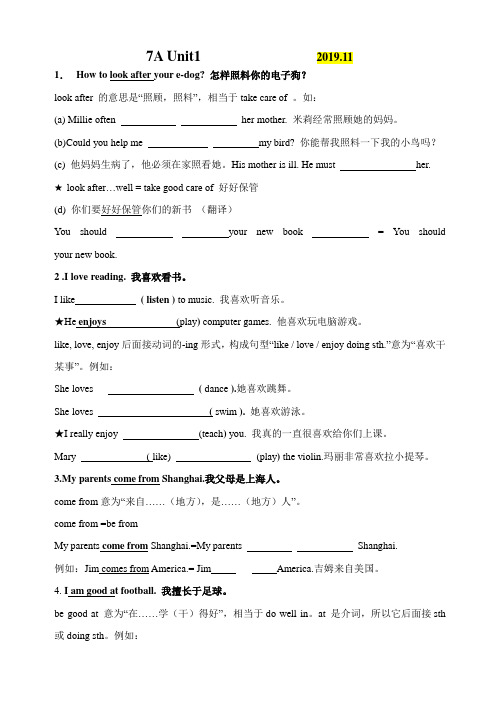
7A Unit1 2019.111.How to look after your e-dog? 怎样照料你的电子狗?look after 的意思是“照顾,照料”,相当于take care of 。
如:(a) Millie often her mother. 米莉经常照顾她的妈妈。
(b)Could you help me my bird? 你能帮我照料一下我的小鸟吗?(c) 他妈妈生病了,他必须在家照看她。
His mother is ill. He must her.★ look after…well = take good care of 好好保管(d) 你们要好好保管你们的新书(翻译)You should your new book = You should your new book.2 .I love reading. 我喜欢看书。
I like ( listen ) to music. 我喜欢听音乐。
★He enjoys(play) computer games. 他喜欢玩电脑游戏。
like, love, enjoy后面接动词的-ing形式,构成句型“like / love / enjoy doing sth.”意为“喜欢干某事”。
例如:She loves ( dance ).她喜欢跳舞。
She loves( swim ).她喜欢游泳。
★I really enjoy (teach) you. 我真的一直很喜欢给你们上课。
Mary ( like) (play) the violin.玛丽非常喜欢拉小提琴。
3.My parents come from Shanghai.我父母是上海人。
come from意为“来自……(地方),是……(地方)人”。
come from =be fromMy parents come from Shanghai.=My parents Shanghai.例如:Jim comes from America.= Jim America.吉姆来自美国。
牛津译林版英语七年级上册各单元重点总结

牛津译林版英语七年级上册各单元重点总结Unit 1: Greetings and Introductions- Key phrases: Hello, Hi, Goodbye, Nice to meet you, What's your name?, My name is...- Basic conversation skills: Greeting people, introducing oneself and others- Vocabulary: Greetings, names of people and countriesUnit 2: Classroom Language- Basic classroom instructions: polite ways to ask for permission, give instructions, and perform actions- Vocabulary: Classroom objects, actions, and instructionsUnit 3: Numbers and Colors- Key phrases: How old are you?, What's your favorite color?, It's red.- Basic conversation skills: Asking about age, talking about favorite colors, describing colors- Vocabulary: Numbers, colors, ageUnit 4: My Family- Key phrases: How many people are there in your family?, This is my mother/father/sister/brother.- Basic conversation skills: Talking about family members, describing family relationships- Vocabulary: Family members, possessive pronounsUnit 5: My School- Key phrases: What's your favorite subject?, Do you like...?, Yes, I do. / No, I don't.- Basic conversation skills: Talking about school subjects, expressing likes and dislikes- Vocabulary: School subjects, opinionsUnit 6: My Friends- Key phrases: Who's your best friend?, What does he/she look like?, He/She is...- Basic conversation skills: Talking about friends, describing appearance- Vocabulary: Words to describe people's physical appearanceUnit 7: Free Time Activities- Key phrases: What do you do in your free time?, I like playing football / reading books / listening to music.- Basic conversation skills: Talking about hobbies and free time activities- Vocabulary: Hobbies and leisure activitiesUnit 8: Daily Routines- Key phrases: What time do you get up/go to bed/eat breakfast?, I get up at.../Go to bed at.../Eat breakfast at...- Basic conversation skills: Talking about daily routines and telling the time- Vocabulary: Daily activities, timeUnit 9: Food and Drinks- Key phrases: Do you like...?, Yes, I do. / No, I don't., Can I have some...?, Sure, here you are.- Basic conversation skills: Talking about food preferences, ordering food and drinks- Vocabulary: Food and drinks, likes and dislikesUnit 10: Clothes- Key phrases: What are you wearing?, I'm wearing a T-shirt/trousers/skirt/shoes, etc.- Basic conversation skills: Talking about clothes and describing what someone is wearing- Vocabulary: Clothing itemsUnit 11: Weather- Key phrases: What's the weather like today?, It'ssunny/rainy/cloudy/windy, etc.- Basic conversation skills: Talking about the weather and describing weather conditions- Vocabulary: Weather words and phrasesUnit 12: Holidays and Celebrations- Key phrases: When is...?, It's on..., What do people do on...?, People usually...- Basic conversation skills: Talking about holidays and celebrations, discussing traditions and customs- Vocabulary: Holidays and celebrations, activities以上是牛津译林版英语七年级上册各单元的重点总结,希望对您有所帮助。
牛津译林版七年级上册英语Unit 1-Unit 4知识点总结

牛津译林版七年级上册英语Unit 1-Unit 4知识点总结Unit 1知识点总结一、单词短语1.love比like程度更深love doing/to do sth. loving doing多表示一贯的爱好,而love to do则多表示具体喜欢做的一件事。
enjoy doing sth (enjoy 译为喜欢,只能加doing)2.What's your name ? 回答:My name is .../ I’m....询问名字的方法还有:May I have your name ?/ Can you tell me your name ?3.master主人one’s master = the master of sb 某物或某人的主人Master(硕士)4.5.How to look after your e-dog.如何照顾你的电子狗。
疑问词+ 不定式(to do)如:I don’t know what to eat.look after=take care of照顾;照料I can look after myself.我能照顾我自己。
look after sb well = take good care of sb 照顾好某人look for 寻找look at 看。
look like 看起来像look out 小心(=Be careful! / Take care)look out of 朝...往外看look the same 看起来一样6.The new students in Class 1, Grade 7 at Sunshine Middle School are greeting each other.Class One Grade Seven 由小到大,都要大写用法相同的还有number ,lesson,unit,group,roomI’m in Grade 7.(对划线部分提问)What/ Which grade are you in?Our school has six grades.我们学校有6个年级。
Unit1知识点梳理2023-2024学年牛津译林版英语七年级上册

第一讲 7A Unit1 Language Point 梳理一.Unit 1 重点语法1.would like / love sth.想要某物例句:Would you like some water?肯定回答:Yes, please. Yes, I’d like / love to.否定回答:No, thanks.2.would like / love to do sth.想要做某事例句:Would you like to drink some water?肯定回答: Yes, I’d like / love to.否定回答:I’d like / love to, but …… .3.糖葫芦形容词结构:数词+ 名词(单数) + (形容词)例:80foothigh 80 英尺高fiveinchtall 5英寸高的7yearold 7岁的注意:①名词必须用单数②只能放在名词前作定语,不能放在be 动词后作表语。
4.read/look/see/watch几个“看”的用法和区别:look 强调看的动作①系动词。
译作看起来,后接形容词。
She looks happy.②不及物动词。
译作看,词组:look at…,用副词修饰。
Tom looked at me angrily.see 及物动词,译作看到,无进行时态,强调看的结果。
watch 及物动词,译作观看,注视。
强调观看正在进行中的,发生变化的活动过程,常用于看电视、看球赛、看演出等。
read 及物动词,译作阅读。
强调看文字内容的东西,常用于看书、看报纸、看杂志等。
5.疑问代词what、which、who 及疑问副词how、when 、where可以和动词不定式连用。
what to do 做什么which to do 做哪个who to do 如何做how to do 谁做when to do 什么时候做where to do 在哪里做6.“疑问词+ to do” 结构经常放在know,learn,see ,ask等动词后做宾语。
2024秋沪教牛津新七年级上知识点清单(背诵版)
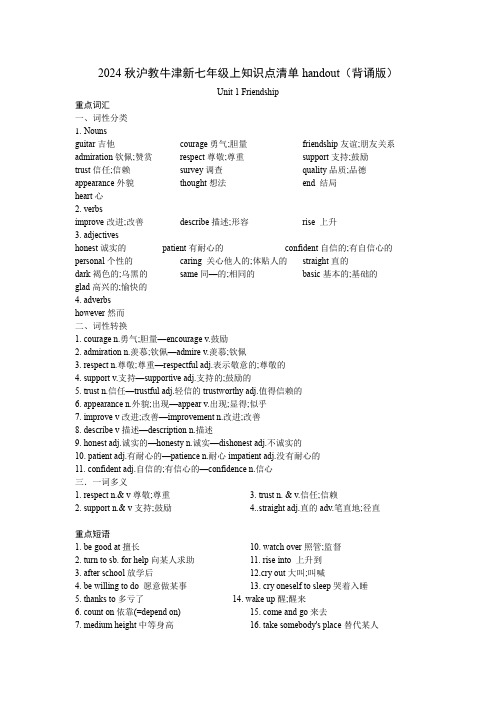
2024秋沪教牛津新七年级上知识点清单handout(背诵版)Unit 1 Friendship重点词汇一、词性分类1.Nounsguitar吉他courage勇气;胆量friendship友谊;朋友关系admiration钦佩;赞赏respect尊敬;尊重support支持;鼓励trust信任;信赖survey调查quality品质;品德appearance外貌thought想法end 结局heart心2. verbsimprove改进;改善describe描述;形容rise 上升3. adjectiveshonest诚实的patient有耐心的confident自信的;有自信心的personal个性的caring 关心他人的;体贴人的straight直的dark褐色的;乌黑的same同—的;相同的basic基本的;基础的glad高兴的;愉快的4. adverbshowever然而二、词性转换1. courage n.勇气;胆量—encourage v.鼓励2. admiration n.羡慕;钦佩—admire v.羡慕;钦佩3. respect n.尊敬;尊重—respectful adj.表示敬意的;尊敬的4. support v.支持—supportive adj.支持的;鼓励的5. trust n.信任—trustful adj.轻信的trustworthy adj.值得信赖的6. appearance n.外貌;出现—appear v.出现;显得;似乎7. improve v改进;改善—improvement n.改进;改善8. describe v描述—description n.描述9. honest adj.诚实的—honesty n.诚实—dishonest adj.不诚实的10. patient adj.有耐心的—patience n.耐心impatient adj.没有耐心的11. confident adj.自信的;有信心的—confidence n.信心三.一词多义1. respect n.& v尊敬;尊重 3. trust n. & v.信任;信赖2. support n.& v支持;鼓励 4..straight adj.直的adv.笔直地;径直重点短语1. be good at擅长10. watch over照管;监督2. turn to sb. for help向某人求助11. rise into 上升到3. after school放学后12.cry out大叫;叫喊4. be willing to do 愿意做某事13. cry oneself to sleep哭着入睡5. thanks to多亏了14. wake up醒;醒来6. count on依靠(=depend on)15. come and go来去7. medium height中等身高16. take somebody's place替代某人8. modern dance现代舞17. come along 出现9. take care of照顾(= look after / care for)核心句式1. What do you like doing?你喜欢做什么?2.Li Hua is helpful and patient.李华乐于助人且有耐心。
牛津译林版英语七年级上册各单元重要概念归纳

牛津译林版英语七年级上册各单元重要概
念归纳
单元一:你好
- 研究基本问候语和自我介绍
- 研究用英语介绍自己的名字、年龄和国籍
- 研究用英语进行简单的日常交流
单元二:我的家庭
- 研究用英语表达家庭成员的名字
- 研究用英语描述家庭成员的外貌和特征
- 研究用英语描述家庭成员的职业和兴趣爱好
单元三:我的学校生活
- 研究用英语表达学校设施和场所的名称
- 研究用英语描述学校日常生活的活动和安排
- 研究用英语介绍自己在学校的角色和职责
单元四:时间和日期
- 研究用英语表达星期、月份和季节的名称
- 研究用英语询问和回答关于时间和日期的问题- 研究用英语描述日常活动的时间和顺序
单元五:我的日常生活
- 研究用英语描述自己的日常活动和作息时间- 研究用英语询问和回答关于日常生活的问题- 研究用英语描述喜欢的食物、运动和爱好
单元六:购物
- 研究用英语表达购物场所和商品的名称
- 研究用英语询问和回答关于购物的问题
- 研究用英语描述购物时的交流和讨价还价
单元七:体育运动
- 研究用英语表达不同的体育运动项目
- 研究用英语询问和回答关于体育运动的问题- 研究用英语描述自己参与过的体育运动经历
单元八:健康和饮食
- 研究用英语表达健康和饮食方面的词汇
- 研究用英语询问和回答关于健康和饮食的问题
- 研究用英语描述自己的饮食偏好和健康惯
以上为《牛津译林版英语七年级上册》各单元的重要概念归纳。
*Note:* *此文档为简要概述,以帮助读者快速了解各单元内容,具体细节可参考教材。
*。
七年级上册,牛津版知识点整理,7AU6知识点梳理
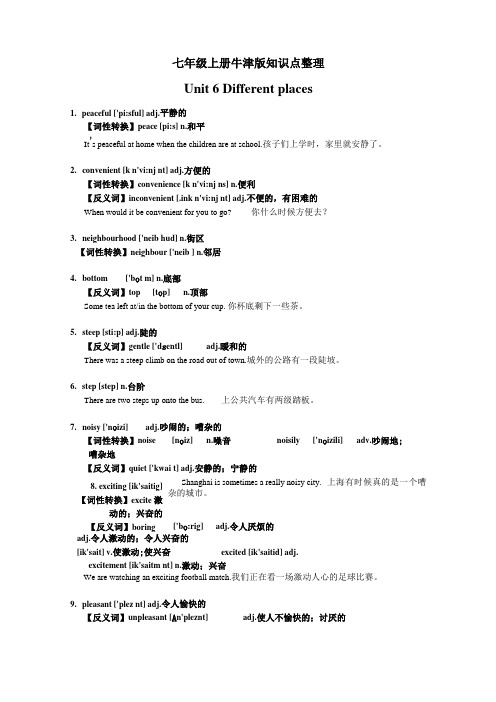
七年级上册牛津版知识点整理Unit 6 Different places1. peaceful ['pi:sful] adj.平静的【词性转换】peace [pi:s] n.和平It ’s peaceful at home when the children are at school.孩子们上学时,家里就安静了。
2. convenient [k n'vi:nj nt] adj.方便的【词性转换】convenience [k n'vi:nj ns] n.便利【反义词】inconvenient [.ink n'vi:nj nt] adj.不便的,有困难的When would it be convenient for you to go? 你什么时候方便去?3. neighbourhood ['neib hud] n.街区【词性转换】neighbour ['neib ] n.邻居4. bottom['b o t m] n.底部【反义词】top[t o p]n.顶部Some tea left at/in the bottom of your cup. 你杯底剩下一些茶。
5. steep [sti:p] adj.陡的【反义词】gentle ['d s entl] adj.暖和的There was a steep climb on the road out of town.城外的公路有一段陡坡。
6. step [step] n.台阶There are two steps up onto the bus. 上公共汽车有两级踏板。
7. noisy ['n o izi]adj.吵闹的;嘈杂的【词性转换】noise [n o iz]n.噪音noisily['n o izili]adv.吵闹地;嘈杂地【反义词】quiet ['kwai t] adj.安静的;宁静的Shanghai is sometimes a really noisy city. 上海有时候真的是一个嘈杂的城市。
牛津译林版七年级英语上册全册知识点汇总(Unit1-8)

牛津译林版七年级英语上册全册知识点汇总(Unit1-8)Unit 1 This is me!知识点归纳汇总Words & Phrases:(结合音标记忆)master/'mɑːstə/、bicycle/'baɪsɪkl/、Excuse/ɪkˈskju:s; ɪkˈskju:z/、hobby/'hɒbɪ/、welcome/ˈwelkəm/、swimming/'swɪmɪŋ/、music/'mjuːzɪk/、polite/pə'laɪt/、chinese/tʃaɪˈniːz/、badminton /'bædmɪnt(ə)n/、cousin/'kʌz(ə)n/enjoy doing、work hard、be good at doing、like to do/doing、look up/after/like/out、help sb do sth、want to do sth、come from、be from、love doing、take sb for a walk、be born in sp、fly a kite with sb、walk to sp = go to sp on foot.Common phonetic:(常见音标)other/'ʌðə/ boat/bəʊt/ phone/fəʊn/ old/əʊld/bread/bred/ great/greɪt/ heavy/'hevɪ/ head/hed/that /ðæt; ðət/ thing /θɪŋ/ these/ðiːz/ those/ðəʊz/dog/dɒg/ shop/ʃɒp/ short /ʃɔːt/ long /lɒŋ/Sentences:1、What is your father ? 提问职业。
牛津上海版初中英语各单元知识点汇总
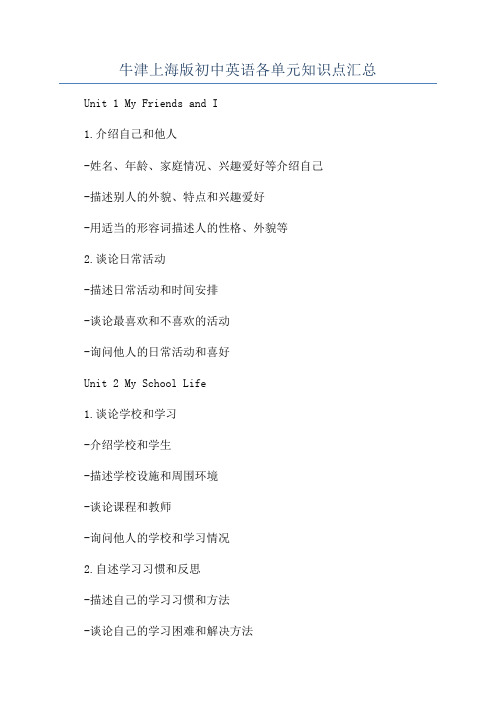
牛津上海版初中英语各单元知识点汇总Unit 1 My Friends and I1.介绍自己和他人-姓名、年龄、家庭情况、兴趣爱好等介绍自己-描述别人的外貌、特点和兴趣爱好-用适当的形容词描述人的性格、外貌等2.谈论日常活动-描述日常活动和时间安排-谈论最喜欢和不喜欢的活动-询问他人的日常活动和喜好Unit 2 My School Life1.谈论学校和学习-介绍学校和学生-描述学校设施和周围环境-谈论课程和教师-询问他人的学校和学习情况2.自述学习习惯和反思-描述自己的学习习惯和方法-谈论自己的学习困难和解决方法-做学习计划和目标-给他人学习建议和鼓励Unit 3 At Home1.描述家庭和住所-描述自己的家庭成员和住所-谈论家庭活动和责任分工-询问他人的家庭和住所情况2.谈论房间和家居用品-描述自己的房间和家居用品-谈论喜欢和不喜欢的房间和家具-询问他人的房间和家居用品情况Unit 4 Out and About1.指路和交通方式-描述如何去其中一地方-描述不同的交通方式-询问他人如何到达其中一地方2.谈论购物和交易-描述购物的地点和方式-询问商品的价格和数量-谈论交易的方式和经验Unit 5 Food and Drinks1.描述食物和饮品-描述不同种类的食物和饮品-询问食物和饮品的口味和偏好-谈论不同的饮食习惯和习惯-谈论对食物和饮品的看法和建议2.谈论饮食习惯和健康-描述自己的饮食习惯和健康问题-谈论健康生活方式和饮食习惯Unit 6 Hobbies1.介绍兴趣爱好和活动-描述自己和他人的兴趣爱好和活动-询问他人的兴趣爱好和活动2.谈论喜欢的体育运动-谈论自己喜欢的体育运动和运动员-询问他人喜欢的体育运动和运动员-谈论体育运动的好处和意义Unit 7 Holidays1.描述假期活动和旅行-描述过去和将来的假期活动-描述旅行的目的地、交通方式和活动-询问他人的假期活动和旅行计划2.谈论文化活动和习俗-描述不同的文化活动和习俗-谈论自己参与过的文化活动和习俗-询问他人的文化活动和习俗Unit 8 In Town1.描述城市景点和地标-描述自己所在的城市景点和地标-谈论旅游的经历和感受-询问他人所在城市的景点和地标2.指导他人如何参观和游玩-描述参观和游玩的流程和方式-给他人参观和游玩的建议和指导-询问他人参观和游玩的经验和意见Unit 9 Weather1.描述天气和季节-描述不同季节的天气和气候-谈论喜欢和不喜欢的天气和季节-询问他人所在地和将要去的地方的天气情况2.谈论天灾和自然现象-描述不同的天灾和自然现象-谈论对天灾和自然现象的了解和防范Unit 10 Out in Nature1.谈论动物和植物-描述不同种类的动物和植物-询问动物和植物的特点和习性-谈论对动物和植物的保护和关注2.描述户外活动和自然景观-描述自己喜欢和参与过的户外活动和自然景观-询问他人喜欢和参与过的户外活动和自然景观。
(完整word版)牛津七年级上英语知识点总结
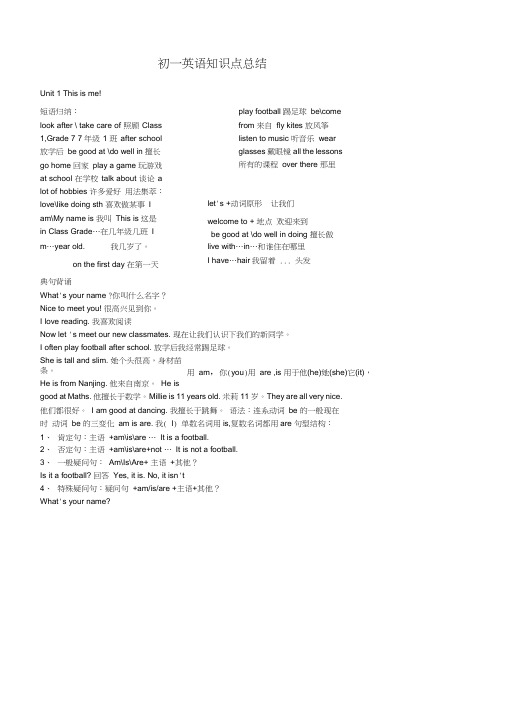
初一英语知识点总结Unit 1 This is me!短语归纳:look after \ take care of 照顾Class 1,Grade 7 7年级1 班after school 放学后be good at \do well in 擅长go home 回家play a game 玩游戏at school 在学校talk about 谈论a lot of hobbies 许多爱好用法集萃:love\like doing sth 喜欢做某事I am\My name is 我叫This is 这是in Class Grade…在几年级几班I m…year old. 我几岁了。
on the first day 在第一天play football 踢足球be\comefrom 来自fly kites 放风筝listen to music 听音乐wearglasses 戴眼镜all the lessons所有的课程over there 那里let's +动词原形让我们welcome to + 地点欢迎来到be good at \do well in doing 擅长做live with…in…和谁住在哪里I have…hair我留着 ... 头发典句背诵What's your name ?你叫什么名字?Nice to meet you! 很高兴见到你。
I love reading. 我喜欢阅读Now let 's meet our new classmates. 现在让我们认识下我们的新同学。
I often play football after school. 放学后我经常踢足球。
She is tall and slim. 她个头很高,身材苗条。
He is from Nanjing. 他来自南京。
He isgood at Maths. 他擅长于数学。
Millie is 11 years old. 米莉11 岁。
牛津译林版英语七年级上册分单元知识点归纳总结(Unit1-8))

牛津译林版英语七年级上册全册知识点归纳总结(最新)Unit one一、词汇知识点整理:look after \ take care of 照顾;表示look 的短语:look after照顾look at 看…;look for 寻找look like 看起来像…on the first day 在第一天Class One, Grade Seven (先说班级,再说年级,且大写)。
play football 踢足球after school 放学后be\come from 来自be good at \do well in 擅长fly kites 放风筝go home 回家listen to music 听音乐play a game 玩游戏wear glasses 戴眼镜at school 在学校all the lessons 所有的课程talk about 谈论over there 那里 a lot of hobbies 许多爱好二、结构用法:love\like doing sth 喜欢做某事let’s +动词原形让我们I am\My name is 我叫welcome to +地点欢迎来到This is 这是be good at \do well in doing 擅长做in Class…Grade…在几年级几班be from = come from + 地点, 意思是“来自某地”。
He is from Nanjing. P8 他来自南京。
live with…in…和谁住在哪里live with sb 和某人住一起;live in+ 城市名,住在某地;live on the ground floor 住在一楼(用介词on)I’m …year old. 我几岁了。
year(s) old ,……岁,如果数词大于1,year 要用复数years. 问年龄要用How old “几岁”提问。
例如:- is your sister? --- She is 11. 应填How old.I have (short/long)hair.我留着短(长)头发三、句式用法What’s your name?你叫什么名字?Nice to meet you! 很高兴见到你。
译林版牛津初中英语七年级上册全册各单元短语、句型归纳整理
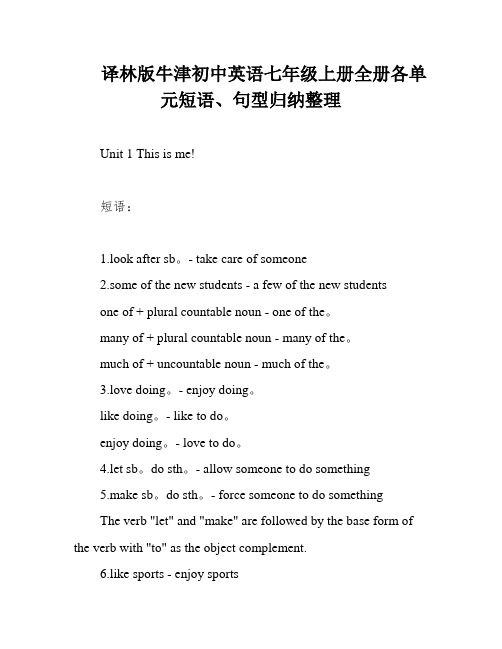
译林版牛津初中英语七年级上册全册各单元短语、句型归纳整理Unit 1 This is me!短语:1.look after sb。
- take care of someone2.some of the new students - a few of the new studentsone of + plural countable noun - one of the。
many of + plural countable noun - many of the。
much of + uncountable noun - much of the。
3.love doing。
- enjoy doing。
like doing。
- like to do。
enjoy doing。
- love to do。
4.let sb。
do sth。
- allow someone to do something5.make sb。
do sth。
- force someone to do somethingThe verb "let" and "make" are followed by the base form of the verb with "to" as the object complement.6.like sports - enjoy sports7.after class - after the classin class - during the class8.be good at (doing)。
- be skilled at (doing)。
9.meet my new friends - meet my new classmates10.over there - in that n11.tell sb。
about sth。
- inform someone about something12.Oh。
牛津七年级上英语知识点总结

一、基本语法知识:1.句子和句子成分:-句子由主语和谓语组成,主语通常是一个名词或代词,谓语是一个动词。
-一个句子可以包含其他成分,如宾语、定语、状语等。
2.名词:-名词可以指人、物、地方、动物等。
-名词有单数和复数形式,一般情况下,单数名词加-s来表示复数。
- 名词还有可数和不可数之分,可数名词可以用a或an来修饰,不可数名词通常不加冠词。
3.形容词:-形容词用来描述名词的特征或特性。
-形容词有比较级和最高级,比较级用于比较两个人或物的不同,最高级用于三个或三个以上的人或物的比较。
4.代词:- 代词用来代替名词,如主格代词(I、you、he/she/it等)、宾格代词(me、you、him/her/it等)、物主代词(my、your、his/her/its 等)等。
5.动词:-动词用来表示动作或状态。
-动词有时态的变化,如现在时(一般现在时、现在进行时)、过去时(一般过去时)等。
-动词有人称的变化,如第三人称单数动词在一般现在时加-s。
6.副词:-副词用来修饰动词、形容词或其他副词,表示时间、地点、方式等。
-副词有比较级和最高级。
7.介词:-介词用来表示时间、地点、方向、目的等关系。
- 常用的介词有at、in、on、by、about、for等。
8.冠词:-冠词用来限定名词的范围,分为定冠词和不定冠词。
- 定冠词是"the",不定冠词是"a"或"an"。
9.祈使句:-祈使句用来表示请求、建议、命令等,一般省略主语,动词用原形。
二、词汇:1.常用动词:- be(am、is、are)、have、do、go、get、like、want、see、make、eat、drink等。
2.与家庭有关的词汇:- family、mother、father、brother、sister、grandfather、grandmother、uncle、aunt等。
牛津沪教版英语七年级上 Units1-5重点知识点复习

七年级上 Unit1-5重点知识点复习1、复习思路巩固复习7A U1-5的重要词汇词组及语法,帮助学生利用假期查漏补缺,为下学期的学习打好基础。
二、复习要点Unit 1 Relatives in Beijing1. see sb. / sth. doing sth.2. another adj.另一个(三者及以上的泛指)Eg. Would you like another orange.I don’t like the shirt. Would you please show me another one?one …the other另一个(两者中另一个)Eg. I have two uncles. One is in Japan, the other is in EnglandUnit 2 Our animal friends1. lovely – lovelier – loveliest friendly adj. – more ~ -most~2. die from自然死亡(非疾病)die of因疾病而死亡3.情景对话用语:that’s right表示观点正确that’s all right(sorry / thanks的回答)not at all(sorry的回答)you are well come(thank you的回答)all right = OK(接收sb.的建议)4.somebody 仅用于肯定句anybody 用于否定、疑问、条件句中有时也用于否定含义的肯定句中5.leave 离开 leave puppy 遗弃leave A to B 离开 A 去 B 6.keep +n. + adj. keep +adj.leave rubbish 扔 leave for B 去 B keep doing sth.7.prefer v. –prefers- preferring-preferred 8.care v.关心 n.照料 adj.adv. carefully (opp.) careful ( opp.) carelesscarefulness (opp.) take care of doingcarelessly n. carelessness take care = be careful 9. adv.+ adj. 10. enough+n.adv 放在 adj.前 adj.+ enough11. every day 和 everyday 的区别:adv.时间状语定语每天的 everyday life 每天的生活save v. safe adj.安全的 safely adv.安全地 safety n.安全 raise a flag 升旗 raise kids 养孩子every day每天everyday adj.12. 13. raise money 筹钱 14. blind adj.The + adj.表示某类人(复数含义) 15. In many different way s 在很多不同的方面16. missing adj.失踪的 miss v.(1)思念(不在身边的)(2)错过Unit 3 friends from other countries1. crowded adj.拥挤的 crowd n.人群 be crowded with 挤满了2. over=more than3. Read 直接 + n. read about = read sth. about 后加某个对象或事件 in the newspaper4. in the magazine5. know about 知道认识(双向)know 了解 XXX 单向6. 8 at school 表示在上学 at the school 表示在学校,不一定在上学adj.What is your nationality?回答要用形容词nationality 国籍9 make friend s with 与…交友 Unit 4 Jobs people do1 what’s your job? =what do you do ? work [u] n. a piece of work job :指已做、应做具体的工作work:指工作,泛指工作,不具体或抽象2. 3. be good at +n./doing sth. = do well in +n./doing sth. job be to do delivery [c]n.递送,邮件 deliver sth. to sp. = sendone’s 4. deliver v. 5. bake v. baker n. cook n.厨师bakery n. 6. cook v.烧饭cooker n.厨具cookery n.烹饪do some cooking 做饭 7. construction n.under ~建设中 construct v.建造~ sth. from sp.从…搬走8. remove v.移去、搬走removal n.9. the same … as … the same 后常加名词单数 the same …as = as … as …the same height as = as tall asmanage v. manage to do sth. the same weight as = as heavy as10. 11. broken adj. 1 )坏的3 )(由于事故)折断的 v. break – broke – brokenbreak [c] n.休息 have a break=have a rest=take a break both … and … 2 )破碎的4)断断续续12. 连接的两部分一样 Unit 5 choosing new flat 1. choose–chose-chosenV.选择 Choice n.选择2.3. too+形容词原级+to sb./sth.太…以至于不能too+形容词原级+for sb.对某人而言太…much + adj./adv.比较级……的多, much修饰adj.的比较级much moremuch lessmuch better much worsemuch lovelier much more different4. with 1)带有和…一起a lady with short hair2) who’s that boy with SAM3)带在身边how much do you take with you4)用… fix TV with a hammer5. what’s the matter?怎样啦?What’s matter with sb.用来询问某人有什么麻烦?= what’s wrong with sb.6. where do you want the … ?= where do you want me to put the…?语法:I. There be句型※构成:“There be +某物/某人+某地/某时”;此结构表示“某地/某时有某人/某物”。
牛津七年级英语上册知识点
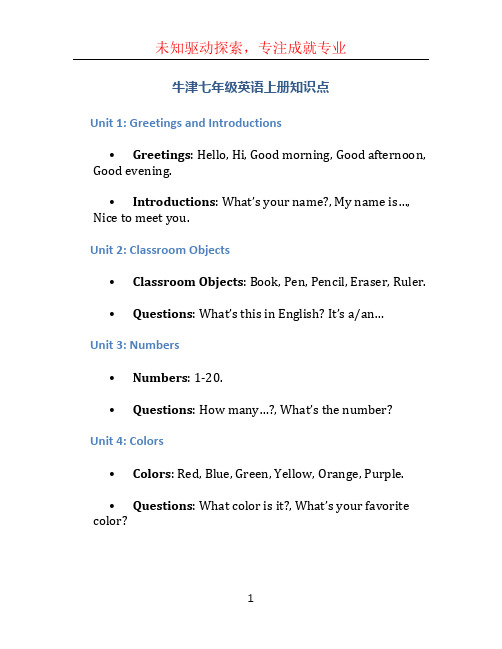
牛津七年级英语上册知识点Unit 1: Greetings and Introductions•Greetings: Hello, Hi, Good morning, Good afternoon, Good evening.•Introductions: What’s your name?, My name is…, Nice to meet you.Unit 2: Classroom Objects•Classroom Objects: Book, Pen, Pencil, Eraser, Ruler.•Questions: What’s this in English? It’s a/an…Unit 3: Numbers•Numbers: 1-20.•Questions: How many…?, What’s the number?Unit 4: Colors•Colors: Red, Blue, Green, Yellow, Orange, Purple.•Questions: What color is it?, What’s your favorite color?Unit 5: Daily Routines•Vocabulary: Get up, Have breakfast, Go to school, Have lunch, Go home, Do homework.•Questions: What time do you…?, When do you…? Unit 6: Family•Vocabulary: Father, Mother, Brother, Sister, Grandfather, Grandmother.•Questions: Who’s this? Who’s that? How many people are there in your family?Unit 7: Describing People•Vocabulary: Tall, Short, Long hair, Short hair, Glasses.•Questions: What’s she/he like? How does she/he look?Unit 8: Food and Drinks•Vocabulary: Rice, Noodles, Bread, Water, Juice, Milk.•Questions: What do you like to eat/drink?Unit 9: School Subjects•Vocabulary: English, Math, Science, Chinese, History, Geography, Music, Art, P.E.•Questions: What’s your favorite subject? What subjects do you study?Unit 10: Time•Vocabulary: W hat time is it?, It’s […].•Questions: What time do you usually…? What time is […]?Unit 11: Hobbies and Activities•Vocabulary: Play basketball, Swim, Dance, Draw, Sing, Listen to music.•Questions: What do you like to do in your free time? Do you like to…?Unit 12: In the Park•Vocabulary: Tree, Flower, Grass, Lake, Playground, Bench.•Questions: What can you see in the park? What do you like to do in the park?Unit 13: Weather•Vocabulary: Sunny, Cloudy, Rainy, Windy, Snowy.•Questions: What’s the weather like today? Do you like […]?。
牛津英语七年级上期各单元知识点归纳
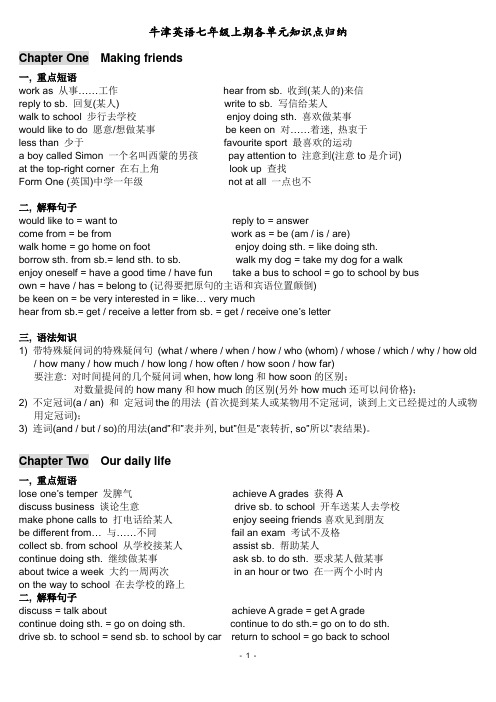
牛津英语七年级上期各单元知识点归纳Chapter One Making friends一, 重点短语work as 从事……工作hear from sb. 收到(某人的)来信reply to sb. 回复(某人) write to sb. 写信给某人walk to school 步行去学校enjoy doing sth. 喜欢做某事would like to do 愿意/想做某事be keen on 对……着迷, 热衷于less than 少于favourite sport 最喜欢的运动a boy called Simon 一个名叫西蒙的男孩pay attention to 注意到(注意to是介词)at the top-right corner 在右上角look up 查找Form One (英国)中学一年级not at all 一点也不二, 解释句子would like to = want to reply to = answercome from = be from work as = be (am / is / are)walk home = go home on foot enjoy doing sth. = like doing sth.borrow sth. from sb.= lend sth. to sb. walk my dog = take my dog for a walkenjoy oneself = have a good time / have fun take a bus to school = go to school by busown = have / has = belong to (记得要把原句的主语和宾语位置颠倒)be keen on = be very interested in = like… very muchhear from sb.= get / receive a letter from sb. = get / receive one’s letter三, 语法知识1) 带特殊疑问词的特殊疑问句(what / where / when / how / who (whom) / whose / which / why / how old/ how many / how much / how long / how often / how soon / how far)要注意: 对时间提问的几个疑问词when, how long和how soon的区别;对数量提问的how many和how much的区别(另外how much还可以问价格);2) 不定冠词(a / an) 和定冠词the的用法(首次提到某人或某物用不定冠词, 谈到上文已经提过的人或物用定冠词);3) 连词(and / but / so)的用法(and”和”表并列, but”但是”表转折, so”所以”表结果)。
牛津版七年级英语上册各单元知识点

牛津版七年级英语上册各单元知识点Unit 1 My New Teachers。
In this unit, we will learn about the different subjects and teachers we have in school. Let's start by learning some vocabulary related to school subjects. 。
First, we have "English". In English class, we learn to read, write, and speak in English. We also learn about grammar and vocabulary. 。
Next, we have "Math". In Math class, we learn about numbers, shapes, and how to solve problems using numbers. 。
Then, we have "Science". In Science class, we learn about the world around us, including plants, animals, and the environment. 。
After that, we have "History". In History class, we learn about the past, including important events and people from the past. 。
Moving on, we have "Art". In Art class, we learn to express ourselves through drawing, painting, and other forms of art. 。
新牛津英语译林版七年级上册各单元全部重点短语和句子

7A 短语和句子n.名词v.动词vt.及物动词vi.不及物动词adj.形容词adv.副词prep.介词pron.代词conj.连词Unit 1 This is me1.look after sb. 照顾某人2.some of the new students 新学生中的一些one of + 可数名词复数…..中的一个many of + 可数名词复数…..中的许多.much of + 不可数名词…..中的许多3.love doing…. 热爱/喜爱做….like doing….喜爱做….enjoy doing…. 喜欢/享受做…sb. do sth. 让某人做某事5.make sb. do sth. 使某人做某事使役动词let, make后面接省to的动词不定式充当宾语补足语、6 like sports 喜爱运动7 after class 课后in class 在课上8. be good at doing…… 擅长做某事=do well in doing……my new friends 见见我的新同班同学there 在那边11. tell sb. about sth. 告诉某人关于某事12. Oh, I see. 哦,我明白了;13. wear glasses 戴着眼镜14. like all the lessons 喜欢所有的功课15. need作为行为动词的用法:need to do don’t / doesn’t need to do16.twelve years old 12岁17. \come from 来自于句子:1.How to look after your e-dog.如何照顾你的电子狗;2.I have short hair. = My hair is short. 我短发;3.Let’s meet my new classmates. 让我们见见我的新同学;4. She is tall and slim. 她高而苗条;5. Daniel is from Nanjing. Daniel来自南京;=Daniel comes from Nanjing.6. She loves dancing. 她热爱舞蹈;7. She is good at swimming. 她擅长游泳; = She does well in swimming.8. This is my cousin Andy. 这是我的表弟Andy.9. Andy, this is my new classmate Kitty. Andy, 这是我的新同学Kitty.10. I come from Nanjing, but now I live with my family in Beijing.我来自南京,但现在我和父母住在北京;11. They are all very nice. 他们都很好;Unit 2 Let’s play sports1. play sports 做运动 6. Walk to my bowl 走到我的碗边2. like walking 喜欢散步go for a walk 去散步take a walk 散步3. enjoy oneself = have a good time 玩得开心= have fun = play happily4. be free 有空be busy 繁忙5. hope to do sth. 希望做某事hope that + 句子希望+ 宾语从句7. come true 梦想实现,成为现实8. at/on weekends = at / on the weekend 在周末9. of course = certainly = sure 当然10. Many of my students 我的许多学生11. else 放在不定代词或疑问代词之后something else 别的东西what else 别的什么,还有什么12. a lot of = lots of 许多修饰可数名词、不可数名词some 一些修饰可数名词、不可数名词many 许多修饰可数名词much 许多修饰不可数名词13. fun 不可数名词乐趣、享乐、有趣的事What great fun 多么有趣的事啊14. talk about 谈论talk of 谈到,说到15. hero – heroes16. many times a day 一天很多次once a week 一周一次twice a month 一月两次tree times a year 一年三次17.my favourite football player 我最喜爱的足球队员18. a new member of Huanghe Football Club黄河足球俱乐部的一个新成员19. look strong 看起来强壮20. play football very well 足球踢得很21. in one’s free time 在某人的空余时间里22. enjoy listening to music 喜欢听音乐23. make sb. do sth. 使某人做某事make sb. + adj. 使某人……make him happy 使他们开心make me sad 使我悲伤24. activity ---- activities 活动25. watch ball games on TV 在电视上看球赛26. 对sometimes, often, usually, always, never, once a week, twice a month等表示频率的词或短语提问用how often / how about ……怎么样句子:1. Are you free = Do you have time 你有空吗2. What’s your favourite sport 你最喜欢的运动是什么3.He also enjoys listening to music. 他也喜欢听音乐;4. Li Hua wants to play in the next World Cup. 李华想参加下届世界杯;5.I hope his dream comes true. 我希望他的梦想实现;6.How does he look 他看上去怎样What does he look like 他看上去像什么7. Do your parents go with you你父母和你一起去吗8. My dad sometimes watches our games. 我爸爸有时候观看我们的比赛;9. My mum often shops at weekends. 我妈妈常在周末购物;10. I often stay at home. 我常待在家里;11. Many of my students like sports我学生中的许多喜欢运动;/我的许多学生喜欢运动;12. What else do you like to do你还喜欢做别的什么事吗13. It makes me feel great. 它使我感到很棒;14. I like reading too. 我也喜欢阅读;15. Me, too. Reading is fun. 我也是;阅读很有趣;16. I often play basketball with my friends after school. 我常在放学后与朋友一起打篮球;Unit 3 Welcome to our schoolthe Open Day 在开放日 2. be ready to do…. 准备好做….parents’ meeting 家长会4. at the school gate=at the gate of the school在学校大门口5. so big 如此大6. watch two of our lessons 观摩我们的两节课7. let me show you around 让我带你参观the ground floor 在一楼英9. this way 这边走10. by the way 顺便说说,顺便问一下11. have a meeting / have meetings at the school hall 在学校礼堂开会12. classroom building 教学楼14. be nice / kind to sb. 对某人好15. It’s very nice/kind of you to do sth.你做某事真好a diary diaries 写日记17. want to say hello to sb. 想向某人问好18. say goodbye to sb. 向某人告别say sorry to sb. 向某人道歉19. get to school 到达学校20. take the bus to school 乘公交车上学=go to school by bus=go to school on a / the bus21. ride a bike to school 骑自行车上学=go to school by bike=go to school on one’s bike23. live near the school 住学校附近24. live far away from the school 住得远离学校25,all kinds of books 各种可样的书26. borrow sth. from sb. 跟某人借某物27. borrow books from the library从图书馆借书28. on one’s way back 在某人回来的路上29. on one’s way home 在某人回家的路上30. on one’s way to school 在某人上学的路上31. Thank sb. for sth. 因为某事谢谢某人32. Thank sb. for doing sth. 为干某事谢谢某人you / Thanks for telling me how to have a party.谢谢你告诉我怎样举办一个晚会;34. all the best 一切顺利,万事如意35. write to sb. 给某人写信=write a letter letters to sb.句子:1. What’s your favourite subject=What subject do you like best2. Which of the subjects do you like best 这些科目中你最喜欢哪个’s the date today 今天几号=What date is it today’s that man in a white shirt 穿白衬衫的那个人是谁5. Our school is really nice. 我们学校真好;6. I can’t hear you well on the phone.在电话里我听不清你的话;7. It’s a long way from my home to the school.从我家到学校有很长一段路;8. The reading room is open. 阅览室是开着的9. ----When is it open 它什么时候开放-----It’s open from 8 . to 5:30 它从早上8点到下午5点半开放;10. It takes me about an hour to get to school.我到达学校大约要花费一个小时;11. What school do you study at你在哪个学校学习Unit 4 My day1. wake up 醒来2. between...and... 在...和...之间3. It’s time for sth. It’s time for sb. to do sth. 是某人干某事的时候了4. go walking in the hills 去山上散步5. seldom go out 很少外出6. need a good rest 需要好好休息=need to have a good rest7. need to do sth. 需要做某事8. From Monday to Friday 从周一到周五9. do morning exercises 做早操10. do eye exercises 做眼保健操11. do some exercise 锻炼12. have lessons 上课13. start begin lessons 开始上课14. do after-school activities 做课外活动15. be never late for work / school 上班/ 上学从不迟到16. one of ….. …….之一;后接可数名词复数17. be all nice to sb. 都对某人很好18. chat with sb. 和某人聊天19. chat with each other 互相聊天20. help each other 互相帮助21. play in the playground 在操场上玩22,be in the school volleyball team是校排球队成员=be a member of the school volleyball team23. practise after school 放学后训练practise doing sth. 练习/训练做某事24. on Wednesday afternoon 在周三下午25have a good time doing sth=have fun doing sth. 做某事过得愉快26. in spring / summer / autumn / winter 27. at 6 years old =at the age of 6 在六岁28. all the best 一切顺利,万事如意29. have much time to do sth. 有很多时间做某事30. have no time to do sth. 没有时间做某事31. go to her dancing lessons 去上舞蹈课32. dance for half an hour 跳舞半小时33. go roller skating 去溜旱冰34. visit a museum 参观博物馆on picnics with my family twice a month 一个月两次和我家人去野餐36..be good for sb. 对...有益37..be bad for sb. 有…..害38. get ready for sth 为...做好准备get ready to do sth 准备好做某事=be ready to do sth.39.. learn a lot about sth 关于某事了解很多40.. learn more about sth. 关于某事了解更多41. too much homework 太多作业42. too many lessons 太多课43. much too cold hot太冷热句子:1. Some dogs just don’t know how to have fun. 有些狗就是不知道怎样玩乐;2. What time do you start lessons 你们什么时候开始上课3. Our lessons begin at a quarter past eight. 我们的课于8:15开始;4.We have a Reading Club. 我们有一个阅读俱乐部;5.I also like playing volleyball. 我也喜欢打排球;6. We always have a good time at school.我们在学校总是过得很开心;7. Millie seldom chats with her friends after 很少与朋友在课后闲聊;8. I would like to tell you about my life here我想告诉你我在这儿的生活;9. We do not have lessons on Saturday or Sunday. 我们在周六和周日不上课;10. How often do they exercise 他们多久锻炼一次11. I hope everyone can come and watch the game. 我希望每个人能来看比赛;Wish our team good luck 祝我们队好运They help us get ready for the day他们帮助我们为一天做好准备;Unit 5 Let’s celebrateup 打扮 2.. dress up as a ghost 乔装打扮成鬼a guess 猜一猜 4. at Christmas = on Christmas Day 在圣诞节Festival中秋节 6. enjoy the full moon赏满月7. knock on / at people’s doors 敲人们的门8. play a trick on sb. / play tricks on sb.捉弄某人9. seem + adj. He seems very happy. seem to do… He seems to be very happy.He seems to like apples. It seems that + 句子; It seems that he is very happy. 他似乎很开心;10. be different from… 与…不同11 wear masks 戴面具12. have a party 开派对13. learn about different festivals around the world 了解全世界不同的节日14. a special day 特别的一天15. make pumpkin lanterns 做南瓜灯16. make lanterns out of pumpkins 把南瓜做成灯houses 串门18.. play a game with the people inside和里面的人做一个游戏dance 舞狮out 找到,发现 a lot of photos 拍很多的照片the world = all over the world全世界23. paint one’s face 给脸涂色24. on the evening of….. 在…..的晚上us some candy as a treat 给我们一些糖果作为招待= give us a treat of candy26 fun 不可数名词much fun 很多乐趣have lots of fun = have great fun 玩得开心What great fun 多么大的乐趣27. on Halloween 在万圣节前夕28. at a restaurant near my home 在我家附近的一家餐馆29. some other nice things 一些别的好东西30. what other things = what else 别的什么东西31. on the radio 在收音机里32 let off fireworks 放烟火33. watch the fireworks 看烟火34. a music and dance show一场音乐舞蹈表演35. most Chinese families 大多数中国家庭36.. at this time of year 在一年的这个时候句子1. Let’s celebrate. 让我们庆祝;2. What is your favourite festival =What festival do you like best 你最喜欢的节日是什么3. All my family get together and have a big dinner. 我所有的家人聚集在一起吃大餐;4. Thank you for telling me about the Mid- Autumn Festival. 谢谢你告诉我中秋节的情况;5. Children have lots of fun on that day. 在那天孩子们有很多的乐趣;’s really a special day. 这真是特殊的一天;7. Family members get together and give each other presents. 家庭成员聚集在一起并互送礼物;8. How do you usually celebrate your birthday 你通常怎样过生日9. What do you get as birthday presents 你得到什么作为生日礼物10. The Spring Festival is an important festival in China. 在中国春节是个重要的节日;11. I am on holiday in New York. 我在纽约度假;12. What do you do to celebrate the Chinese New Year in Beijing 你们在北京做什么事庆祝春节13. There is a great Spring Festival Gala on TV every year. 电视上每年都有盛大的春节联欢晚会;14. Children have lots of fun on this day. 孩子们在这一天玩得很开心;15. Usually our parents get new clothes ready for us. 我们的父母为我们准备好新衣服;16. We get red packets from our parents. 我们从父母那得到压岁钱;17. They are really wonderful. 他们真的很精彩Unit 6 Food and lifestyle1. all kinds of food 各种各样的食物2. keep fit = keep healthy 保持健康……away 远离4. plan to do… 计划做…planning5. more than 超过,多于6. dance for half an hour every day每天跳舞半小时7. feel hungry between meals在两餐之间感到饿8. Too much sugar 太多糖my lifestyle 改变我的生活方式swimming pool 一个游泳池11. four kilos of meat 四公斤肉12. five cartons of milk 五盒牛奶13. how to keep fit 如何保持健康14. less than 3 times a week 少于一周三次three to six times a week 一周三到六次15.exercise more 多运动16.eat less 少吃17.Have a look 看一看18. take a walk 散步19. All right,好的,行the day well 很好的开始一天21. taste good 尝起来不错;此处taste 为系动词22.. have a healthy lifestyle 有一个健康的生活方式句子1. It’s good for our health. 这对我们的健康有益;2. Healthy food is important for me.= It’s important for me to have healthy food.健康食物对我很重要;/对于我来说吃健康食物很重要;3. They have too much sugar and are bad for my teeth. 他们有太多的糖并对我的牙齿有害;4. I need to change my lifestyle now. 现在我需要改变我的生活方式;5. I plan to eat more fruit and vegetables every day. 我计划每天吃更多水果蔬菜;6. You need to exercise more and eat more healthy food.你需要多加锻炼并多吃健康食品;7. I seldom eat cakes or sweets. 我很少吃蛋糕和糖果;7. Let me have a look at the menu. 让我看一看菜单;8. What would you like to order 你们想要点什么9. Apple juice tastes good. 苹果汁尝起来不错;10. I often play football to keep fit. 我常踢足球保持健康;helps me start the day well. 这帮助我很好的开始一天;12. This meal gives me energy for the whole afternoon. 这顿饭为我整个下午提供能量;13. We need them to keep healthy. 我们需要他们来保持健康;14.. An apple a day keeps the doctor away. 一天一苹果,医生远离我;Unit 7 Shopping1. come with me 跟我来2. need sb. to do sth. 需要某人做某事3. flower / shoe /gift shop 花/鞋/礼品店clothes / sports shop 服装店/体育用品商店4. go shopping = do some shopping = buy some things 购物/买东西5. hate doing…/ hate to do…. 讨厌做….6. be interested in doing sth. 对做…感兴趣the street 沿着这条街8. be sure 确信、相信9. just a minute = wait a minute = wait a moment = wait for a short time 稍等片刻10.enough修饰adj./adv.时喜欢放在后good enoughenough修饰n.时常放在前面enough moneyall the bags 拎所有的包12. wait for….. 等待…13. be different from… 与….不同14. the same as…. 与…一样15. another 又一,另一,用于三者或以上a look看一看much 多少钱18. price用高、低high, low形容,不用贵、便宜形容19. . buy Simon a present 买给西蒙一个礼物= buy a present for Simon 为西蒙买一个礼物20. last year’s cards 去年的卡片21. different kinds of hair clips 不同种类的发卡22. go well with… 与…很配23. help the children in some poor areas帮助一些贫困地区的孩子24. walk a long way to school 走很长的路上学25. try on 试穿26. one floor of restaurants 一个楼层的饭馆27.. on the top floor 在顶楼句型1.There’s a new mall down the street.沿着这条街走有一个新建的大型购物中心;2.What can I help you/Can I help you您需要什么3.How much do they costHow much are they他们多少钱’ll take /buy them.我就买它们;5.. Not far away from my school, there is also a supermarket. 离我学校不远也有个超市;need books most. 他们最需要书;7.. We can use our pocket money to buy them these things. 我们可以用零用钱买给他们这些东西;8. Thank you for your help. 谢谢你的帮助;9.. What’s your size Size 40. 你穿几码40码;10.. They fit very well. 他们很合适;11. Can we see another pair 我们可以再看一双吗12.. There are five floors of shops. 有五层楼的商店;13. There are foods from different areas. 有来自不同地区的食物;14.. The mall is a good place to meet friends and have fun.这个购物中心是与朋友见面和玩乐的好地Unit 8 Fashion1. spend +时间/钱+ on sth. 花时间/钱在..上.spend +时间/钱+ in doing sth.花时间、钱做某事2. so lazy 如此懒惰3.. sports clothes 运动服4. lend sth. to sb. = lend sb. sth.把某物借给某人5.. borrow sth. from sb. 跟某人借某物6.. between ….and …在...与…之间用于两者之间7. be made of… 由….制成能看出原材料be made from…由….制成不能看出原材料be made in + 地点产于某地be made by + 人被…制造8.下列的fit 为adj. be fit for …. 适合于…They are fit for a long walk. 他们适合长时间步行14. 下列fit为v. They fit me very well. 他们很适合我;The coat doesn’t fit me.那件外套不适我;15. ten more minutes = another ten minutes 再多10分钟16. hold / have/ give a fashion show 举办一个时装展17. design a poster for the “Fashion Wall”给Fashion Wall设计一张海报18. show you different styles of clothes给你看不同式样的衣服19. look smart / modern and beautiful 看起来时尚和漂亮20.. look great in white创白色很棒21. both of them 他俩都22. a black wool skirt 一件黑色羊毛短裙23. a pair of long red leather boots 一双红色长筒皮靴24. 感叹句的构成:1、What + n.短语+ 主语+ 谓语What a great show it is 这是多棒的表演啊What tall buildings they are 他们是多高的楼啊What fine weather it is 这是多好的天气啊2、How + adj./adv. + 主语+ 谓语How great the show is 表演多棒啊How tall the buildings are 这些楼多高啊How fine the weather is 天气多好啊25.most young people 大多数年轻人26. wait for the school bus 等校车27. lie on the bed 躺在床上28. go for a dinner 去赴宴29. have to do sth. 必须/不得不做某事30. feel soft and smooth 摸上去柔软光滑句型1. What do you think of …. = How do you like ….. 你认为….怎么样2. I’m thinking about what to wear. = I’m thinking about what I should wear.我正考虑穿什么3. I can spend ten more minutes in bed then. 那么我可以在床上多待10分钟了;4. Would you like one more apple = Would you like another apple 你想再要一个苹果吗5. Can you lend us your red blouse for our fashion show, Mum妈妈,你能把你的红衬衫借给我们参加时装表演吗6. What size is your blouse Size 4. 你的衬衫是什么尺寸大小4;7. Trainers are light and comfortable and are popular among young people.8. Here comes Simon. 西蒙走来了;9. That’s all for today’s show.= So much for today’s show. 今天的表演到此结束;for coming. 感谢光临;11. You look great in your purple shirt. 你穿紫色衬衫看起来棒;12. The purple shirt looks great on you. 紫色衬衫穿在你身上看起来棒;13. That pair of long boots is made of leather. 那双长靴是皮革制成的;14. The jacket is not too long or too large. 这夹克不太长也不太大;15. My design includes a pair of blue jeans. 我的设计包括一条蓝色牛仔裤;。
- 1、下载文档前请自行甄别文档内容的完整性,平台不提供额外的编辑、内容补充、找答案等附加服务。
- 2、"仅部分预览"的文档,不可在线预览部分如存在完整性等问题,可反馈申请退款(可完整预览的文档不适用该条件!)。
- 3、如文档侵犯您的权益,请联系客服反馈,我们会尽快为您处理(人工客服工作时间:9:00-18:30)。
牛津英语七年级上期各单元知识点归纳Chapter One Making friends一, 重点短语work as 从事……工作hear from sb. 收到(某人的)来信reply to sb. 回复(某人) write to sb. 写信给某人walk to school 步行去学校enjoy doing sth. 喜欢做某事would like to do 愿意/想做某事be keen on 对……着迷, 热衷于less than 少于favourite sport 最喜欢的运动a boy called Simon 一个名叫西蒙的男孩pay attention to 注意到(注意to是介词)at the top-right corner 在右上角look up 查找Form One (英国)中学一年级not at all 一点也不二, 解释句子would like to = want to reply to = answercome from = be from work as = be (am / is / are)walk home = go home on foot enjoy doing sth. = like doing sth.borrow sth. from sb.= lend sth. to sb. walk my dog = take my dog for a walk enjoy oneself = have a good time / have fun take a bus to school = go to school by bus own = have / has = belong to (记得要把原句的主语和宾语位置颠倒)be keen on = be very interested in = like… very muchhear from sb.= get / receive a letter from sb. = get / receive one’s letter三, 语法知识1) 带特殊疑问词的特殊疑问句(what / where / when / how / who (whom) / whose / which /why / how old / how many / how much / how long / how often / how soon / how far) 要注意: 对时间提问的几个疑问词when, how long和how soon的区别;对数量提问的how many和how much的区别(另外how much还可以问价格);2) 不定冠词(a / an) 和定冠词the的用法(首次提到某人或某物用不定冠词, 谈到上文已经提过的人或物用定冠词);3) 连词(and / but / so)的用法(and”和”表并列, but”但是”表转折, so”所以”表结果)。
Chapter Two Our daily life一, 重点短语lose one’s temper 发脾气achieve A grades 获得Adiscuss business 谈论生意drive sb. to school 开车送某人去学校make phone calls to 打电话给某人enjoy seeing friends喜欢见到朋友be different from…与……不同fail an exam 考试不及格collect sb. from school 从学校接某人assist sb. 帮助某人continue doing sth. 继续做某事ask sb. to do sth. 要求某人做某事about twice a week 大约一周两次in an hour or two 在一两个小时内on the way to school 在去学校的路上二, 解释句子discuss = talk about achieve A grade = get A gradecontinue doing sth. = go on doing sth. continue to do sth.= go on to do sth.drive sb. to school = send sb. to school by car return to school = go back to schoolfail the exam = not pass the exam never fail an exam = pass all the exams assist sb. with sth. = help sb. with sth. assist sb. to do sth. = help sb. (to) do sth. lose one’s temper = be angrymake phone calls to sb. = ring sb. up = call sb. = phone sb.collect sb. from school = pick sb. up from school三, 语法知识1) 一般现在时的用法: 用来表示现在的状态、经常的或习惯性的动作、真理、基本事实或常见现象等(注意: 表示客观真理的句子只能用一般现在时态)。
2)一般现在时的构成(肯定句/否定句/疑问句)以及肯定/否定回答,谓语动词第三人称单数的变化规则,以及be动词的形式;3) 描述频率的副词和副词短语(always / usually / often / sometimes / seldom / never)* 顺便注意这几个形近词/词组的区别sometimes / some time / some times / sometime。
Chapter Three Troubles一, 重点短语deal with 对待,处理hold out 取出,伸出show sth. to sb. 给某人看某物find sth. missing 发现某物不见了stare at sb. 盯着某人hurry to… 赶往某地go after 跟着某人steal sth. from sb. 从某人偷某物sth. happens to sb. 某人发生某事hurry aboard 匆忙等上船argue with sb (about sth.) 和某人争论(某事) go up 走上前去get off 下(车,船等) begin arguing 开始争吵see sb. doing sth. 看见某人正在做某事on the other side of the river 在河的对岸pick up 捡起,拿起in time 及时二, 解释句子how…deal with sth. = what …do wi th sth. sth. happens to sb.= sb. have sth.show sb. sth. = show sth. to sb. stare at = look at … tightlyin a hurry = hurriedly hurry to…= go to … in a hurry / hurriedly hurry to do = do sth. in a hurry / hurriedly go after sb. = follow sb.hurry aboard = get onto the ship (or plane) in a hurry / hurriedlysteal sth. from sb. = steal one’s sth. argue with sb. = speak angrily to sb. not…anything = nothingwhat happened? = what’s the matter? = what’s up? = what’s wrong?三, 语法知识1) 一般过去时的用法: 表示过去某一时刻发生的动作或存在的状态,常与这些时间状语连用(e.g.: yesterday, two days ago, last week, just now, in 2010…);2) 一般过去时的构成: 由主语+动词的过去式构成(要掌握规则动词的过去式变化规则以及常见的不规则动词的变化形式eg. go>went, catch>caught, find>found…)。
Chapter Four The world of numbers一, 重点短语be able to do sth. 能做某事have to do sth. 不得不做某事hundreds of …上百个….. thousands of…上千个…..consist of 包括help sb. (to) do sth. 帮助某人做某事add…to………加上……subtract…from………减去……multiply…by………乘以……divide…by………除以……in ancient times 在古代stand for 代表in a flash 一瞬间,在一眨眼的时间at least 至少start…with 从……开始two thirds 三分之二traffic accident 交通事故start from…. 从……开始二, 解释句子however = but (后面没有逗号) almost = nearlyconsist of = be made up of = include stand for = representhelp sb. (to) do sth. = help sb. with sth. start…with = begin…within a flash = very quickly= in a very short time …plus… = add…to……minus… = subtract or take…from…… times … = multiply … by…… divided by …= divide … by …. at least = not less than三, 语法知识1) 数词的用法(基数词/ 序数词/ 分数/ 小数/ 百分数/ 日期时间表达法);2) 常见电话用语(e.g.: Who is (that) speaking? 而不说Who are you?; 回答是this is XXXspeaking. 而不说I am XXX.);3) 祈使句的用法: 是用来表示请求、命令、劝告、祝愿或建议的句子。
